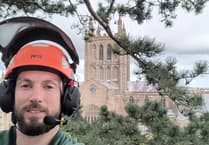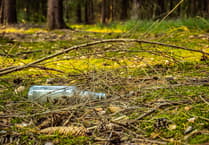Forestry England and Wye Coppice are working together to bring back the practice of coppicing to Dymock Forest.
Coppicing was a part of Forestry England’s management of Dymock Forest however the practice had been ‘falling out of rotation’ in some areas of the forest.
The new partnership with Wye Coppice aims to bring all areas of Dymock Forest back into regular management with a team that includes trainees who have recently started a year-long programme to learn the art of coppicing.
Forestry England community ranger Miranda Thomason said: “Forestry England is pleased to be supporting the next generation of woodland and forestry workers.”
She added: “this is providing an opportunity for Wye Coppice trainees to be involved with the practical woodland management of a Site of Special Scientific Interest– trainees are practicing their coppicing skills and creating valuable habitat areas.”
Coppicing involves cutting certain cutting certain broadleaved tree species to ground level and then allowing multiple stems to regrow – with the stems that are cut able to produce sustainable products such as hedging stakes and charcoal.
Not only is the practice of coppicing important to improve biodiversity as it helps to provide habitats for wildlife, but the increased light that is able to reach the forest floor encourages a greater range of woodland plant to grow, such as wood anemones and bluebells.
Joe Weaver, director of Wye Coppice, said: “Coppicing has immense benefits for nature as well as providing sustainable wood products, and I’m committed to championing coppicing as both a woodland management technique and a heritage skill.”
“Our trainees will spend 12 months under the mentorship of our experienced foresters and coppice workers to develop their skills and take part in community engagement activities that showcase the brilliant outcomes coppicing can achieve for woodlands and wildlife.”
One trainee, Jazmin Jones, said: “I want to help have a positive impact in our woodlands and on our climate - the trainee programme is a great opportunity to learn more about woodlands and natural processes on the job, with a passionate team of people who are generous with their knowledge.”





Comments
This article has no comments yet. Be the first to leave a comment.